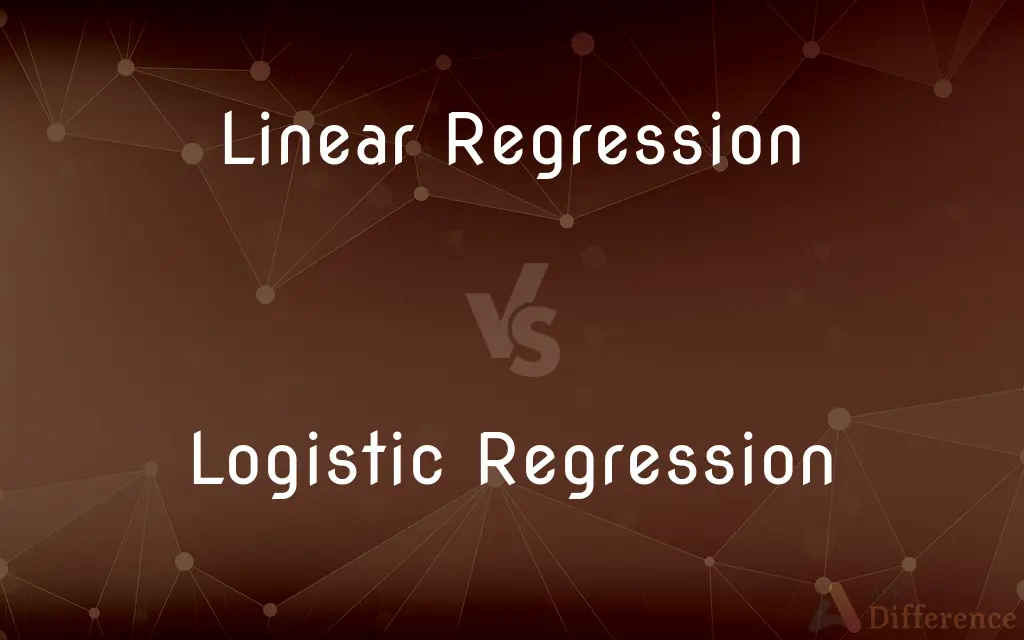Linear Regression vs. Logistic Regression — What's the Difference?
By Tayyaba Rehman — Published on January 11, 2024
Linear Regression predicts continuous outcomes, while Logistic Regression is used for binary classification.

Difference Between Linear Regression and Logistic Regression
Table of Contents
ADVERTISEMENT
Key Differences
Linear Regression is a statistical method used for predicting a continuous dependent variable based on one or more independent variables. It assumes a linear relationship between the input and output. In contrast, Logistic Regression is used for binary classification tasks, where the output is categorical, typically representing the probability of belonging to a particular class.
Linear Regression models the relationship by fitting a linear equation to observed data. The equation for a simple linear regression is y = mx + c, where y is the dependent variable, x is the independent variable, m is the slope, and c is the y-intercept. On the other hand, Logistic Regression uses a logistic function to model a binary outcome, with the equation being p = 1 / (1 + e^-(mx + c)), where p is the probability of the dependent variable being in a particular class.
The output of Linear Regression is a continuous value, which can be any real number. It's often used in scenarios like predicting house prices or stock market trends. Conversely, the output of Logistic Regression is a probability value ranging between 0 and 1, used to classify data into binary categories like 'spam' or 'not spam' in email filtering.
In terms of assumptions, Linear Regression assumes a linear relationship between variables and homoscedasticity (constant variance of errors). Logistic Regression does not require these assumptions but does assume the linearity of independent variables and log odds.
While Linear Regression is prone to overfitting with many features and is sensitive to outliers, Logistic Regression is more robust to outliers and can work better with binary or categorical output variables.
ADVERTISEMENT
Comparison Chart
Outcome Type
Continuous values
Binary categories (0 or 1)
Equation Form
Y = mx + c
P = 1 / (1 + e^-(mx + c))
Usage Scenario
Predicting quantities, prices, etc.
Classification tasks, binary outcomes
Output Interpretation
Real number representing predicted value
Probability of belonging to a particular class
Assumptions
Linearity, homoscedasticity
Linearity in log odds
Compare with Definitions
Linear Regression
Predicts a continuous variable based on other variables.
Linear Regression was used to forecast sales based on advertising spend.
Logistic Regression
Used for binary classification problems.
Logistic Regression classified emails as spam or not spam.
Linear Regression
Used in scenarios with quantitative output.
We applied Linear Regression to predict housing prices.
Logistic Regression
Outputs probabilities between 0 and 1.
Logistic Regression gave a probability of 0.8 for a customer making a purchase.
Linear Regression
Models relationships using a straight line.
The Linear Regression model showed a positive trend between temperature and ice cream sales.
Logistic Regression
Suitable for binary outcomes in data.
Logistic Regression was effective in diagnosing diseases as positive or negative.
Linear Regression
Assumes a linear relationship between variables.
Linear Regression assumes that more study hours lead to higher scores.
Logistic Regression
Uses a logistic function for classification.
The logistic function in Logistic Regression helped distinguish between pass and fail.
Linear Regression
Involves finding the best-fitting line through data.
Linear Regression helped us understand how age affects blood pressure.
Logistic Regression
Models probability of the default class.
We used Logistic Regression to predict the likelihood of loan default.
Common Curiosities
Can Linear Regression be used for classification?
It's not suitable for classification due to its continuous nature.
What is Logistic Regression?
A statistical method used for binary classification problems.
When should I use Linear Regression?
When predicting a continuous variable, like temperature or prices.
What is Linear Regression?
A statistical method for predicting continuous outcomes based on one or more predictors.
When is Logistic Regression more appropriate?
For binary classification tasks, like disease diagnosis or spam detection.
Is Logistic Regression limited to two classes?
While primarily for binary classification, it can be extended to multiple classes.
What are the assumptions of Linear Regression?
Assumes linearity, homoscedasticity, and normal distribution of residuals.
Are there assumptions for Logistic Regression?
Assumes linearity between predictors and log odds, but not normal distribution.
Can I predict probabilities with Linear Regression?
It's not recommended, as its output isn't constrained between 0 and 1.
Are Logistic Regression predictions always binary?
Yes, though the underlying probability estimate allows for a degree of uncertainty.
Is Logistic Regression good for large datasets?
Yes, it can perform well with large datasets.
Can I use Linear Regression for time series analysis?
It can be used but isn't ideal due to autocorrelation issues in time series data.
How do outliers affect Linear Regression?
They can significantly impact the model, leading to erroneous predictions.
Can Linear Regression handle categorical predictors?
Yes, after converting them into numerical values through encoding.
How do I interpret Logistic Regression coefficients?
Coefficients represent the change in log odds for a one-unit change in the predictor.
Share Your Discovery

Previous Comparison
Vitamin B vs. Vitamin C
Next Comparison
Ahi vs. MahiAuthor Spotlight
Written by
Tayyaba RehmanTayyaba Rehman is a distinguished writer, currently serving as a primary contributor to askdifference.com. As a researcher in semantics and etymology, Tayyaba's passion for the complexity of languages and their distinctions has found a perfect home on the platform. Tayyaba delves into the intricacies of language, distinguishing between commonly confused words and phrases, thereby providing clarity for readers worldwide.













































